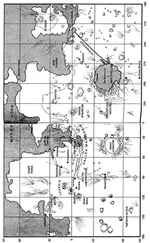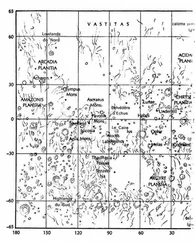Michel Duval tried to reassure her. “A lot of these disagreements are symptoms of the flight. Once on Mars, we’ll pull together. And we have more than just what we brought on the Ares to help us— we’ll have what the unmanned landers have brought already, shipments of equipment and food all over the surface and the moons. All that’s there for us. The only limit will be our own stamina. And this voyage is part of that— it’s a kind of preparation, a test. If we fail this part, we won’t even get to try on Mars.”
“Exactly my point!” Phyllis said. “We are failing in this.”
Sax stood, looking bored, and pushed off toward the kitchen. The hall was filled with the seashell roar of many small discussions, some of them acrimonious in tone. A lot of people were angry at Arkady, clearly; and others were angry at them for getting upset.
Maya followed Sax into the kitchen. As he cleaned his tray he sighed. “People are so emotional. Sometimes it seems like I’m stuck in an endless performance of the play No Exit .”
“That’s the one where they can’t get out of a little room?”
He nodded. “Where hell is other people. I hope we don’t prove the hypothesis.”
• • •
A few days later the landers were ready. They would descend over a period of five days; only the Phobos team would stay in what was left of the Ares , guiding it to its near-docking with the little moon. Arkady, Alex, Dmitri, Roger, Samantha, Edvard, Janet, Raul, Marina, Tatiana, and Elena said their farewells, absorbed already in the task at hand, promising to descend as soon as the Phobos station was built.
The night before the descent Maya couldn’t sleep. Eventually she gave up trying, and pulled herself through the rooms and corridors, up to the hub. Every object was sharp-edged with sleeplessness and adrenaline, and every familiarity of the ship was countered or overwhelmed by some alteration, a lashed-down stack of boxes or a dead-end in a tube. It was as if they had already left the Ares . She looked around at it one last time, drained of emotion. Then she pulled herself through the tight locks, into the landing vehicle she had been assigned to. Might as well wait there. She climbed into her spacesuit, feeling, as she so often did when the real moment came, that she was only going through another simulation. She wondered if she would ever escape that feeling, if being on Mars would be enough to end it. It would be worth it just for that: to make her feel real for once! She settled into her chair.
A few sleepless hours later she was joined by Sax, Vlad, Nadia, and Ann. Her companions belted in, and they ran through the check-out together. Toggles were flipped, there was a countdown. Their rockets fired. The lander drifted away from the Ares . Its rockets fired again. They fell toward the planet. They hit the top of the atmosphere, and their single trapezoidal window became a blaze of Mars-colored air. Maya, vibrating with the craft, stared up at it. She felt tense and unhappy, focused backward rather than forward, thinking of everyone still on the Ares ; and it seemed to her that they had failed, that the five of them in the lander were leaving behind a group in disarray. Their best chance for creating some kind of concord had passed, and they had not succeeded; the momentary flash of happiness she had felt while brushing her teeth had been just that, a flash. She had failed, then. They were going their separate ways, splintered by their beliefs, and even after two separate years of enforced togetherness they were, like any other human group, no more than a collection of strangers. The die was cast.
It formed with the rest of the solar system, around five billion years ago. That’s fifteen million human generations. Rocks banging together in space, and then coming back and holding together, all because of the mysterious force we call gravity. That same mysterious warp in the weft of things caused the pile of rocks, when it was big enough, to crush in on its center, until the heat of the pressure melted the rock. Mars is small but heavy, with a nickel-iron core. It is small enough that the interior has cooled faster than Earth’s; the core no longer spins inside the crust at a different speed, and so Mars has practically no magnetic field. No dynamo left. But one of the last internal flows of the molten core and mantle was in the form of a huge anomalous lumping outward on one side, a shove against the crust wall that formed a continent-sized bulge eleven kilometers high, three times as high as the Tibetan plateau is above its surroundings. This bulge caused many other features to appear: a system of radial fractures covering an entire hemisphere, including the largest cracks of all, the Valles Marineris, a lace of canyons that would cover the United States coast to coast. The bulge also caused a number of volcanoes, including three straddling its spine, Ascraeus Mons, Pavonis Mons, and Arsia Mons; and off on its northwest edge, Olympus Mons, the tallest mountain in the solar system, three times the height of Everest and one hundred times the mass of Mauna Loa, the Earth’s largest volcano.
So the Tharsis Bulge was the most important factor in shaping the surface of Mars. The other major factor was meteor fall. In the Noachian Age, three to four billion years ago, meteors were falling on Mars at a tremendous rate, millions of them, and thousands of them were planetesimals, rocks as big as Vega or Phobos. One of the impacts left behind Hellas Basin, 2,000 kilometers in diameter, the largest obvious crater in the solar system, although Daedalia Planum appears to be the remains of an impact basin 4,500 kilometers across. Those are big; but then there are areologists who believe that the entire northern hemisphere of Mars is an ancient impact basin.
These big impacts created explosions so cataclysmic that it is hard to imagine them; ejecta from them ended up on the Earth and the Moon, and as asteroids in Trojan orbits; some areologists think that the Tharsis Bulge started because of the Hellas impact; others believe that Phobos and Deimos are ejecta. And these were only the largest impacts. Smaller stones fell every day, so that the oldest surfaces on Mars are saturated with cratering, the landscape a palimpsest of newer rings obscuring older ones, with no patch of land untouched. And each of these impacts released explosions of heat that melted rock; elements were broken out of their matrix and fired away in the form of hot gases, liquids, new minerals. This and the outgassing from the core produced an atmosphere, and lots of water; there were clouds, storms, rain and snow, glaciers, streams, rivers, lakes, all scouring the land, all leaving unmistakable marks of their passage— flood channels, stream beds, shorelines, every kind of hydrologic hieroglyphic.
But all that went away. The planet was too small, too far from the sun. The atmosphere froze and fell to the ground. Carbon dioxide sublimed to form a thin new atmosphere, while oxygen bonded to rock and turned it red. The water froze, and over the ages seeped down through the kilometers of meteor-broken rock. Eventually this layer of regolith became permeated with ice, and the deepest parts were hot enough to melt the ice; so there were underground seas on Mars. Water always flows downhill, so these aquifers migrated down, slowly seeping, until they pooled behind some stoppage or another, a rib of high bedrock or a frozen soil barrier. Sometimes intense artesian pressures built against these dams; and sometimes a meteor would hit, or a volcano appear, and the dam would burst apart and a whole underground sea would spew over the landscape, in enormous floods, floods ten thousand times the flow of the Mississippi. Eventually, however, the water on the surface would freeze, and sublime away in the ceaseless dry winds, and fall on the poles in every winter’s fog hood. The polar caps therefore thickened, and their weight drove the ice underground, until the visible ice was only the tip of two world-topping lenses of underground permafrost, lenses ten and then a hundred times the visible caps’ volume. While back down toward the equator, new aquifers were being filled from below, by outgassing from the core. And some of the old aquifers were refilling.
Читать дальше
Конец ознакомительного отрывка
Купить книгу












